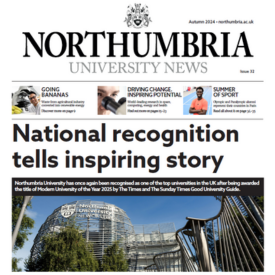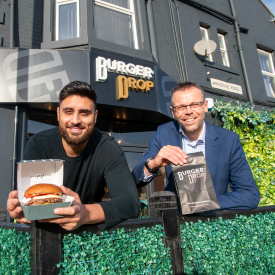-
Study
-
Undergraduate
- Search for a Course
- Undergraduate Open Day & Events
- Application Guides
- Northumbria University UCAS Exhibitions
- Foundation Years
- Undergraduate Fees & Funding
- School & College Outreach
- Continuing Professional Development
-
Postgraduate
- Postgraduate Study Degree
- Postgraduate Research Degrees
- Postgraduate Open Days and Events
- Postgraduate Fees & Funding
- Flexible Learning
- Thinking about a Masters?
- Continuing Professional Development
- Change Direction
-
Student Life
- The Hub - Student Blog
- Accommodation
- Life in Newcastle
- Support for Students
- Careers
- Information for Parents
- Students' Union
- Northumbria Sport
- Be Part of It
-
-
International
International
Northumbria’s global footprint touches every continent across the world, through our global partnerships across 17 institutions in 10 countries, to our 277,000 strong alumni community and 150 recruitment partners – we prepare our students for the challenges of tomorrow. Discover more about how to join Northumbria’s global family or our partnerships.
View our Global Footprint-
Applying to Northumbria
- European Union
- Our London Campus
- Northumbria Pathway
- International Events
- Entry Requirements and Country Representatives
- Regional Offices
-
Northumbria Language Centre
- Faculty Requirements
- Acceptable English Requirements
- Pre-sessional English Language and Study Skills
- Academic Language Skills Programmes (ALS)
-
International Fees, Funding & Scholarships
- International Undergraduate Fees
- International Undergraduate Funding
- International Masters Fees
- International Masters Funding
- International Postgraduate Research Fees
- International Postgraduate Research Funding
- International Money Matters
-
Life at Northumbria
- International student support
- Careers
-
International Mobility
- Current Northumbria Students
- Incoming Exchange Students
-
-
Business
Business
The world is changing faster than ever before. The future is there to be won by organisations who find ways to turn today's possibilities into tomorrows competitive edge. In a connected world, collaboration can be the key to success.
More on our Business Services -
Research
Research
Northumbria is a research-rich, business-focused, professional university with a global reputation for academic quality. We conduct ground-breaking research that is responsive to the science & technology, health & well being, economic and social and arts & cultural needs for the communities
Discover more about our Research -
About Us
-
About Northumbria
- Our Strategy
- Our Staff
- Place and Partnerships
- Student Profiles
- Alumni Profiles
- Leadership & Governance
- Academic Departments
- University Services
- History of Northumbria
- Contact us
- Online Shop
-
-
Alumni
Alumni
Northumbria University is renowned for the calibre of its business-ready graduates. Our alumni network has over 244,000 graduates based in 178 countries worldwide in a range of sectors, our alumni are making a real impact on the world.
Our Alumni - Work For Us
What will I learn on this module?
Screenwriting 3 is the concluding module of your chosen specialist pathway in Film & TV Production, where you get the opportunity to produce a practical project portfolio of work that is the culmination and demonstration of all that you have learned in the programme modules, but specifically follows submission to your chosen pathway.
You will learn how to develop a feature film script from idea to final draft, or a TV pilot and series bible from idea to final draft . Through this module you will learn advanced methodologies for creating compelling characters, strong narrative structures, believable dialogue, whilst maintaining the author’s original voice. You may choose to work independently, or as part of a creative team through writer’s room sessions. You will build on what you have already learned in relation to modern screenwriting theories. You will develop a professional attitude to your work, enabling you to take notes and apply them to the script, hit draft deadlines and self-motivate. You will be able to work to a structured delivery pattern and to initiate and resolve your own research. This final screenwriting module, should be regarded as the capstone of your study in the form, it relies on full participation from each student, who is required to attend all lectures, tutorials and any associated writer’s room sessions.
How will I learn on this module?
The module makes provision to engage in practical project based work supported by workshops including writer’s rooms, and tutorials via one on one script editing sessions, leading to the creation of a feature length script/teleplay pilot with series treatments (equivalent to 5000 words) and a final script project (equivalent to 1000 words).
You will be guided from initial idea, through several drafts until an industry standard script for a final draft feature or Television Pilot Episode and series bible is written. You will learn through interaction with your tutor how to receive and assess script notes and work to deadlines.
Taught sessions are structured to reflect the core issues and themes of the module. Your tutor will frame the content of each session and outline the aim and outcomes. Tutors begin the sessions by outlining clear parameters, defining the considerations that will enable you to develop your practical work while also developing a critical understanding of principles needed to deliver effective productions. Every module is underpinned by a strong conceptual foundation. The module aims to help you to develop your skills by applying those critical concepts to your own practice. The sessions help to guide you through that development by offering formative feedback as you work through the materials and processes. Guided project work creates an experiential environment on which tutors offer insight.
Outside of the taught sessions, you will be expected to engage with module-relevant reading in preparation for the sessions. An electronic reading list is supplied via the e-Learning Portal, which will guide you towards appropriate resources, although you are encouraged to explore the wider library catalogue to engage with additional sources too. During your independent working time, it is also expected that you will apply the ideas raised in the reading and the taught content to film examples of your own choosing (reflecting your individual interests), and to your own practice.
Learning materials, lecture guidelines and module information will be placed upon the eLearning Portal and professional screenwriting software is provided in the form of Final Draft, which is industry standard, screenwriting and formatting software.
How will I be supported academically on this module?
Based on a dissertation model, the module begins with some contextualising lectures but soon focuses on, workshops such as the writer’s room, where you can brainstorm your original ideas with your tutor and / or other students, which then leads on to one to one tutorials in an effort to develop your autonomous learning and initiative in your practice, as self-motivation is a key skill of the writer for the screen. The module will be delivered by tutors experienced in the common practice of writing for the screen, as a day to day activity, with realistic deadlines set. The structures of drafting, workshopping through writer’s room sessions and feedback through script editing sessions are inbuilt into this module. In this way, the argument for work becomes central as does a reflective methodology that responds to continual feedback in the form of notes, from the tutor acting as script editor / producer – which is the norm in professional TV and film production.
The module is fully supported on the eLearning Portal with all learning materials made available.
Following the formative feedback you receive at several points during the module, summative feedback is offered on submission of the work, this will direct you towards ways to improve your skills as a screenwriter, or creative producer, as well as understanding your strengths and weaknesses. Final Draft software is provided by the university, for the correct formatting of script and to aid delivery of successive drafts.
Where appropriate you may also be directed to engage with our Skills Plus or other resources offered through the University Student Support Services such as Dyslexia Support. Guidance tutorials also provide opportunities for students to discuss, in confidence, their academic progress on the programme.
What will I be expected to read on this module?
All modules at Northumbria include a range of reading materials that students are expected to engage with. Online reading lists (provided after enrolment) give you access to your reading material for your modules. The Library works in partnership with your module tutors to ensure you have access to the material that you need.
What will I be expected to achieve?
Knowledge & Understanding:
1. Demonstrate an understanding of advanced narrative scriptwriting, covering story structure, development of credible and motivated characters and effective dialogue.
2. Identify the potential of a story and/or subject for a narrative film.
Intellectual / Professional skills & abilities:
3. Critically analyse your work, responding professionally to notes, and delivering to deadlines.
4. Create scripts of a professional standard in an appropriate format while using and understanding the techniques of screenwriting and audio-visual presentation where relevant to scriptwriting.
Personal Values Attributes (Global / Cultural awareness, Ethics, Curiosity) (PVA):
5. Apply cultural and ethical awareness as part of professional deportment by, for example, observing taste and decency protocols.
How will I be assessed?
You will receive verbal feedback throughout the module as you complete the various exercises designed to explore the information/ideas in the lectures addressing all MLOs. You will receive written feedback on your final summative submissions which will detail areas of your methodological practice and critical and creative skills, that could be improved in future work. You will also be offered the opportunity to receive further verbal feedback following this formal assessment, so that you can follow up any concerns regarding your critical development and future learning.
Summative assessments will test skills of critical engagement and practice and will be focused upon the application of key issues arising from the syllabus addressing MLOs 1, 3 & 5. You will be assessed by producing an individual screenwriting portfolio that will be equivalent to 6000 words. The portfolio will contain the script for a final feature screenplay, as well as previous drafts and treatments and script addressing all MLOs.
Pre-requisite(s)
none
Co-requisite(s)
none
Module abstract
You will learn how to develop a feature film script from idea to final draft, or a TV pilot and series bible from idea to final draft. Through this module you will learn advanced methodologies for creating compelling characters, strong narrative structures, believable dialogue, whilst maintaining the author’s original voice. You may choose to work independently, or as part of a creative team through writer’s room sessions. You will build on what you have already learned in relation to modern screenwriting theories. You will develop a professional attitude to your work, enabling you to take notes and apply them to the script, hit draft deadlines and self-motivate. You will be able to work to a structured delivery pattern and to initiate and resolve your own research. This final screenwriting module, should be regarded as the capstone of your study in the form, it relies on full participation from each student, who is required to attend all lectures, tutorials and any associated writer’s room sessions.
Course info
UCAS Code P310
Credits 40
Level of Study Undergraduate
Mode of Study 3 years Full Time or 4 years with a placement (sandwich)/study abroad
Department Arts
Location City Campus, Northumbria University
City Newcastle
All information is accurate at the time of sharing.
Full time Courses are primarily delivered via on-campus face to face learning but could include elements of online learning. Most courses run as planned and as promoted on our website and via our marketing materials, but if there are any substantial changes (as determined by the Competition and Markets Authority) to a course or there is the potential that course may be withdrawn, we will notify all affected applicants as soon as possible with advice and guidance regarding their options. It is also important to be aware that optional modules listed on course pages may be subject to change depending on uptake numbers each year.
Contact time is subject to increase or decrease in line with possible restrictions imposed by the government or the University in the interest of maintaining the health and safety and wellbeing of students, staff, and visitors if this is deemed necessary in future.
Useful Links
Find out about our distinctive approach at
www.northumbria.ac.uk/exp
Admissions Terms and Conditions
northumbria.ac.uk/terms
Fees and Funding
northumbria.ac.uk/fees
Admissions Policy
northumbria.ac.uk/adpolicy
Admissions Complaints Policy
northumbria.ac.uk/complaints














